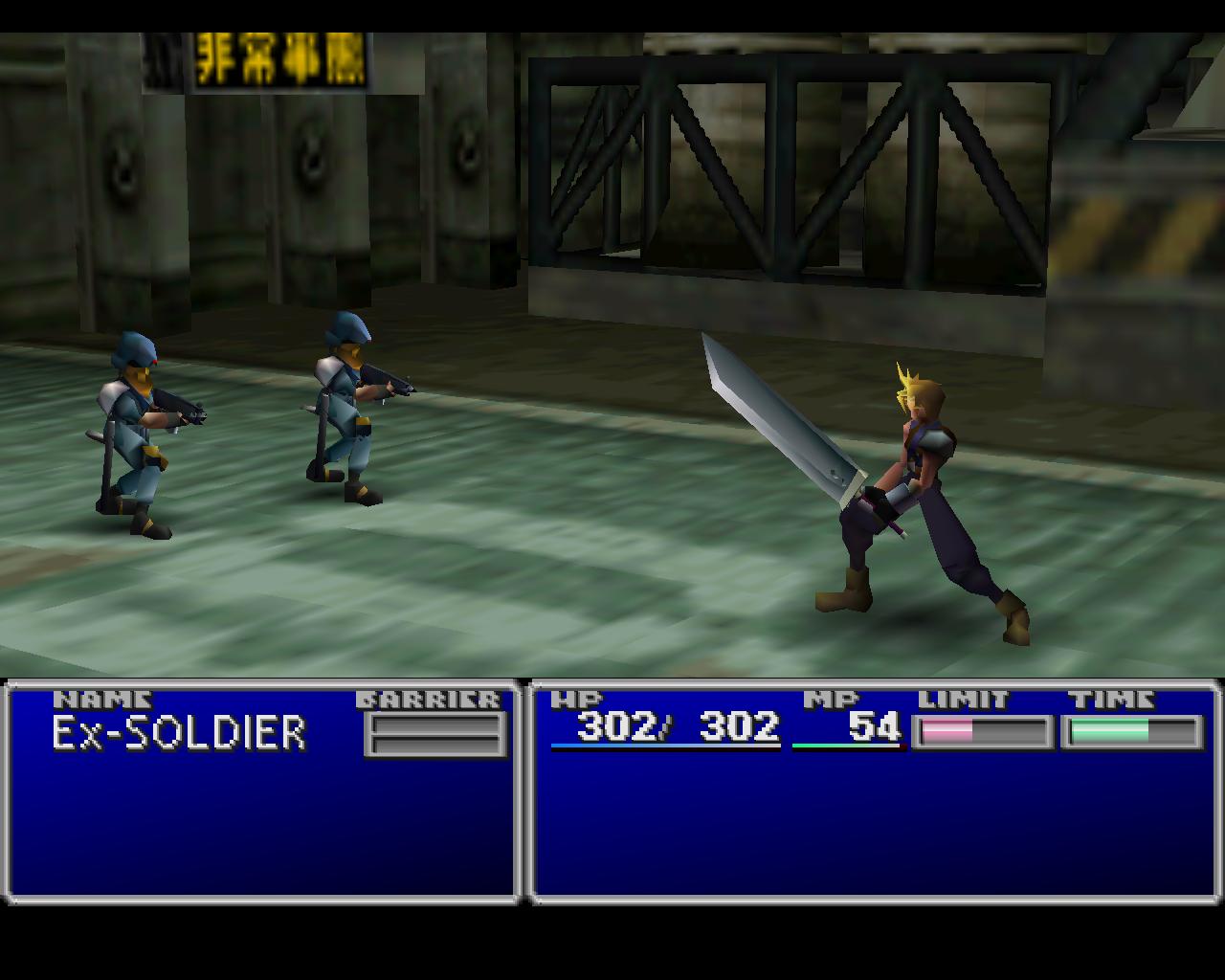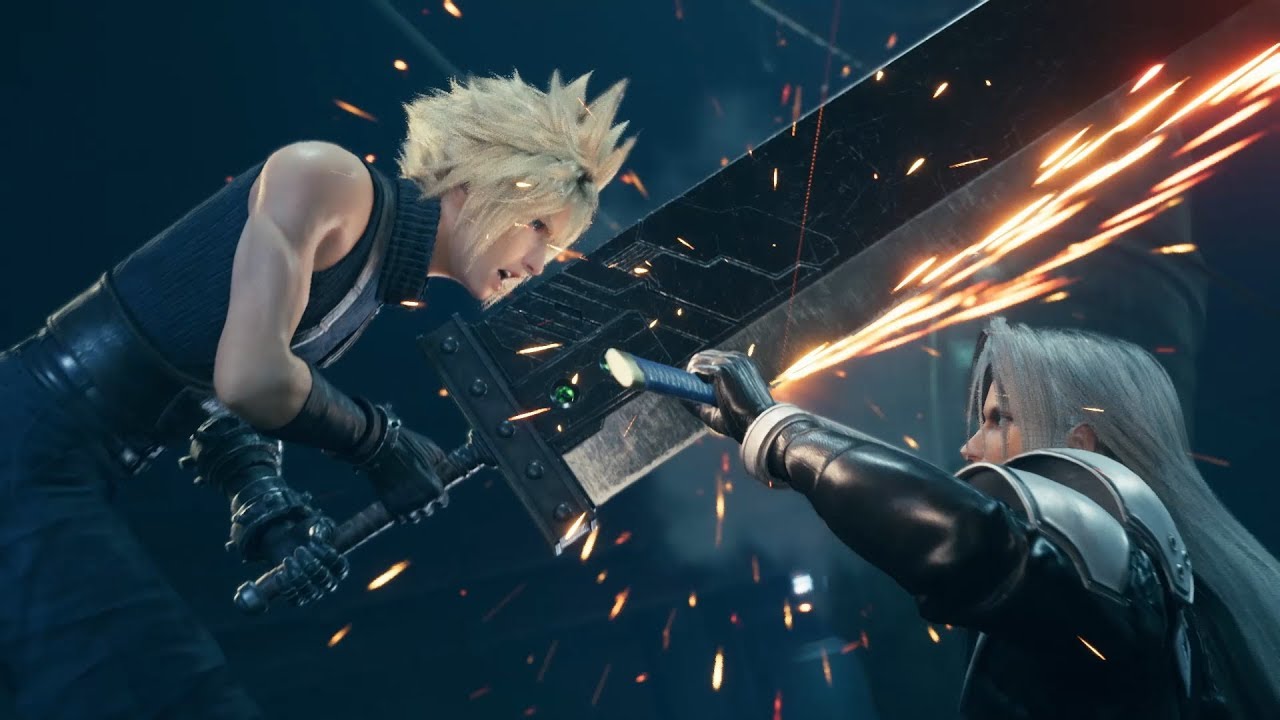
Why Final Fantasy VII’s Trans Story Resonates
WARNING: While incredible, this piece is also VERY spoiler-filled, so please proceed with caution.
I once looked in the mirror. My hair fell around my pale shoulders. I wore a dress, my knees and hairy legs exposed. I felt more open than usual, prone as I was to jeans and graphic tees. But, it fit me. After so much pain and self-doubt, there was something here. Looking, I thought that, maybe I could be someone I would not hate. There are no mirrors in Final Fantasy VII, reflection was even harder to render back then, but Cloud’s image is still reflected. As the game spirals deeper into his psyche, he reinvents himself over and over. FF7 revisits Cloud’s past several times. Each time it gains new narrators, new perspectives and new truths. But when these reinventions end Cloud emerges, he remembers who he is and chooses to move on. It is like looking into a mirror and imagining a self beyond the present.
Cloud’s realization, a subtextual coming out, takes place over hours of the game. When we first meet him, Cloud is gruff and uncaring. Simply a mercenary for hire, he takes a job with eco-terrorists because he needs the cash. He refuses to learn his companions’ names. When his boss Barrett explains the planet’s plight, Cloud shrugs it off, “It’s not my problem.” Before we even know his name he is branded “Ex-SOLIDER,” effectively christening him as a former fantasy special operative. In short, he’s a video game protagonist: aloof and badass, with a mysterious past to boot. He even has a humongous sword.
This is not who Cloud is and the cracks in this facade show themselves immediately. When his childhood friend, Tifa, expresses concern Cloud blows it off, but Tifa continues to question him. Though Cloud is supposedly a badass, the person who has known him the longest thinks he needs to be protected. When Cloud first gets the chance to tell his story, he doubles down on his facade. He returned to his hometown, having joined the ranks of a powerful military force. He is the only one to duel Sephiroth, a legendary SOLDIER and the game’s primary antagonist, at his height and live. Even in Cloud’s own words, the story fractures. While you play the flashback, Cloud is only level 1, while Sephiroth has power beyond the player’s current reach. Static interrupts the story’s coherence. Cloud pointedly does not remember what happened during his and Sephiroth’s fight.
When the game builds up to another confrontation with Sephiroth, we revisit Cloud’s story again. At this point, Sephiroth has become a mythic, almost Freudian, masculine force. He longs for a distant mother and kills his clone copies. He also possesses an almost godlike ability to control reality, constructing illusions and controlling Cloud from a distance. As Sephiroth carries Cloud through his memories again, he points at the holes and reveals that Cloud did not exist five years ago. Sephiroth gloats, “You are just a puppet… You have no heart… and cannot feel any pain…” Cloud is a fake clone of Sephiroth, with false memories, meant only to complete Sephiroth’s plans. This is, all told, a very video game twist. The male hero’s violence was all the plan of some distant force is a theme from Bioshock to Spec Ops: The Line to Far Cry 3. What makes FF7 unique and surprising is that it takes that one step further, unveiling that twist’s own construction.
After an incoherent and injured Cloud falls into the literal blood of the earth (FF7 is wild y’all), his story is told a third time. Clouds – yes, plural – guide Tifa through a tour of their mind. We revisit multiple scenes: Tifa and Cloud’s childhood, his return to his hometown, and his confrontation with Sephiroth. In this sequence, Cloud reveals a deep-seated childhood anxiety about his masculinity. Unable to save Tifa from a childhood accident and too small to stand up for himself, he took it all as a personal failure. He says, “I wanted to be noticed. I thought if I got stronger someone would notice.” He left his hometown to prove himself, but found only more disappointment. He never got into SOLDIER. After the terror of watching Sephiroth destroy his hometown, and nearly dying fighting him, he retreated into a masculine delusion. He imprinted on Sephiroth’s actual SOLDIER companion, Zach, whose sword Cloud now carries. This ties Cloud’s initial characterization to a hegemonic, masculine order. The military preyed on his anxiety to make him into a cog. He would only ever serve “greater men” than him. To heal, to be himself, Cloud must move past his desire to be part of that. He must accept himself, failures and all.
Cisnormative culture wants both trans and cis people to believe that their bodies are not their own, that every person must conform to the whims of “biology.” Sephiroth’s dire proclamation of Cloud being “a puppet” is an echo of this. As is young Cloud’s anxiety about weakness. There is an inevitably to masculinity that FFVII captures at an apocalyptic scale. However, at every turn, the game affirms Cloud’s power to determine his own identity. When he finally comes to himself and confesses to his crew, he says “I’m going to live my life without pretending.” After which he gains a previously obscured lightness. When he and his friends are about to descend into their final battle, he famously says “let’s mosey.” He no longer pretends to be aloof and uncaring, but rather embraces the particular way he expresses his care.
It’s important to note that Cloud’s relationship with his “truth” is not finding some fundamental self. Rather, it acknowledges identity’s construction. As Cloud moves away from the force that proscribed a violent masculinity to him, Cloud realizes that he can be who he wants to be. Tumblr user timocracticyouth sees Final Fantasy VII as being “about drag.” As in, the game shows us how much of our experience with gender is just performance. It’s an identity still constructed, but yet more true. Sometimes we choose who we are, that doesn’t make it less real.
Now, you might be wondering why I haven’t yet mentioned FF7’s most explicitly queer coded sequence: the infamous Honeybee Inn, when Cloud cross dresses as a woman to get information from an evil executive. This is because The Honeybee Inn is easy to understand. It’s simply bigoted. Most of the jokes rely on how funny it is that Cloud would be in a dress, and how ridiculous the idea of men being attracted to him is. The executive’s predatory behavior is played entirely for laughs. It’s one of the many things in FFVII that were likely uncomfortable at the time, but feel inexcusable now. One could do a deeper reading. It’s worth noting for example, that as soon as Cloud dresses up, everyone not in the know sees him as a woman. Gender is still performance. However, I’m not interested in walking through a section that is so clearly hateful for cheap laughter.
Then why revisit Final Fantasy VII at all when its only literal depiction of gender nonconformity is bigoited? First of all, it’s worth working through a story’s contradictions. The obviously coded, discourse inspiring moments can complicate what a work does, but they do not complete it. FF7 is interested in how violence uses norms of masculinity to perpetuate itself and gives its main character a strikingly coherent way to free himself. The Honeybee Inn doesn’t stop that. Second, I find the abstract approach to Cloud’s journey to be fundamentally compelling. In her essay on The Matrix, Esther Rosenfield states that “Seeing trans characters is nice, but what speaks to me so much more powerfully is seeing my own experience through genre allegory. That experience isn’t best relayed literally, because my trans feelings are so abstract.” This is largely true for me as well. The “queer” stories that most often resonate with me are sub-textually, rather than literally, about repression and self-actualization. My “trans canon” includes everything from Bruce Springsteen’s song Dancing in the Dark to Ursula K. Le Guin’s novel The Tombs of Atuan. Very rarely are these works about explicitly trans characters. Rather Dancing in the Dark communicates a desperate need to connect to a body that will not cooperate. The Tombs of Atuan is, quite literally, about the terror of being nameless, of being in a culture built around you that cannot tolerate you. It’s an interpretative act that requires a leap, but I find it incredibly satisfying. Rather than waiting for someone to make a story for me, I take it and make it my own.
That doesn’t make FF7 less complicated. When the game is literally about queerness, it is callous and cruel. It takes a tone of mocking hilarity, comfortable in its distance from people “like that.” Its subtextual queerness, however, is deeply compassionate, perhaps because it is filtered through a – seemingly- straight cis man. Cloud isn’t “representation” as such. I don’t know that I can reclaim Cloud’s womanhood, especially as it is forced upon him in such an obviously “satirical” context. In addition, there are the facts of the material world. None of the people who wrote FFVII are queer, as far as I know. Buying FFVII or its remake now goes to support one massive, heartless company that endangered people’s lives in their mishandling of the current crisis. Finding resonance in corporate produced art has obvious limitations. It cannot and will not replace materially supporting your marginalized peers (*cough* shameless plug for Uppercut’s Patreon *cough*). However, I do think it does help us imagine new fictions, new stories, even new selves. It’s similar at least to the power Cloud gives himself at his journey’s end. The power to know the past, but be free from it. The power to become more than what we are made to be. The power to imagine a future beyond our sight.









5 thoughts on “Why Final Fantasy VII’s Trans Story Resonates”